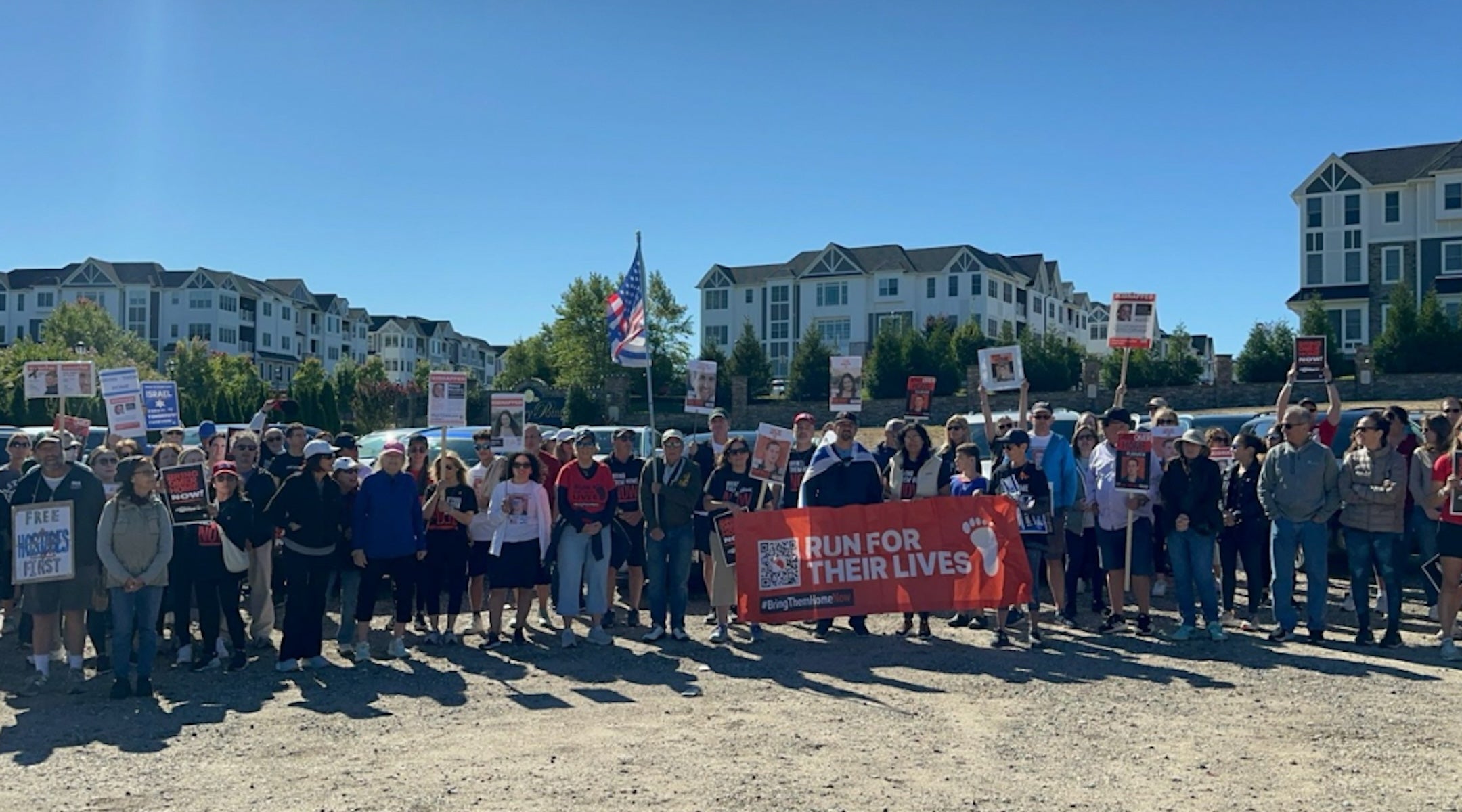This article was produced as part of JTA’s Teen Journalism Fellowship, a program that works with Jewish teens around the world to report on issues that affect their lives.
Sunday marked the 84th week of the Run for Their Lives walk in Plainview, New York, and I have attended about 50 of them. Over the past year, I never felt nervous during these walks meant to raise awareness for the hostages held in Gaza, knowing that my town has a large Jewish population and that we have the support of the local police.
However, last Sunday, I approached the march with a slight sense of fear. On June 3, a man tossed homemade fire bombs at a Run for Their Lives march in Boulder, Colorado, injuring 12 people. After the Boulder firebombing, many communities across the country faced a painful question: Should the walks continue?
When I arrived at the parking lot near the Plainview Shoprite where the Sunday morning Run for Their Lives walk began, I saw a heavy police presence: more than eight patrol cars and a state trooper securing the main road for the march.
What I hadn’t expected to see were crowds of people carrying Israeli flags and hostage posters: Despite the hate crime in Boulder, 150 people in my Syosset/Plainview chapter showed up for the weekly one-and-a-half mile walk. We ignored the police barricades and focused on our mission to call on the United States government and international leaders to bring the 55 remaining hostages home.
Through the 20-minute walk, I couldn’t stop thinking about the peaceful marchers in Boulder. Those walking with me spoke about the attack and how shocking the incident was. Every step felt like a meditation on what it means to be Jewish.
Fellow walkers, like college student Benjamin Handell, were thinking about the attack as well. He said that people in our community generally feel safe. “But I imagine Boulder felt safe, too, until last week,” Handell said.
Handell attends the walks whenever he is home from Tufts University. He felt that it was especially important to take part in Sunday’s walk. “I could not just stay home, after the news I knew I had to be at the walk and be with my Jewish community,” he said.
Whether he knew it or not, Handell was following the advice of my dad, Joel Levenson, the senior rabbi at Midway Jewish Center in Syosset. “We say today, as we always have: We will not cower. We will not be silenced,” wrote Levenson in a post to Instagram last Friday. “We will run for their lives — and for our lives. We run with faith. We run with unity. We run with hope that cannot be extinguished…bring every hostage home — the living for rehabilitation, the deceased for a proper, dignified burial.”
Run for Their Lives, an international grassroots organization, was founded days after the Hamas terror attacks on Oct. 7, 2023. What began as a small demonstration of solidarity in Los Gatos, California has grown into a global campaign with over 230 chapters worldwide, all advocating for the safe return of the remaining hostages held in Gaza.

The Run for Their Lives group at the Israel Day Parade in Manhattan, May 18, 2025. (Shira Weiss)
In Syosset/Plainview, and across other chapters on Long Island, the leaders discussed their safety fears after the Boulder attack and decided to move forward with the march.
Shira Weiss, a local leader and global coordinator, called the support following Boulder “unbelievable.”
“People reached out immediately by emailing and messaging on social media. They said, ‘Don’t stop. This is so important,’” she said. “So we knew we had to keep going, we just had to figure out how to do it safely, because that’s always been a top priority.”
During the 20-minute walk toward the Jewish Community Center, Handell, the Tufts student, overheard conversations not just about Boulder, but about the rising wave of antisemitic incidents across the country.
“The arson attack on Gov. Josh Shapiro’s house during Passover, the murder of two Israeli Embassy staffers at the Jewish Museum in D.C., and Trump’s travel warnings for Jews and Israelis — especially in Jewish spaces and at events raising awareness for the hostages, there’s more concern now,” said Handell.
Handell says the concern manifests itself when he sees more security at events and witnesses or participates in careful planning efforts when it comes to Jewish advocacy.
This tension, as he described it, seems to be prevalent in all Jewish spaces. However, he said, the big turnout on Long Island made it is clear that the Jewish community has faith in a future where the hostages are returned and Jews feel safe both here and abroad.
As I looked around the crowd, I saw a strong people whose presence and pride comforted me.
“What I value most is how our community has come together, even people from different backgrounds and political views. As long as we stay united, I have hope,” said Weiss. “In such a divisive time, this shared purpose is helping to bring us together.”
The horrific attack in Boulder stunned communities across the country. But instead of silencing the Jewish people, it sparked a renewed commitment. In Syosset and Plainview that commitment was clear: We will not retreat. We will keep running and walking and gathering until they all come home.
JTA has documented Jewish history in real-time for over a century. Keep our journalism strong by joining us in supporting independent, award-winning reporting.






